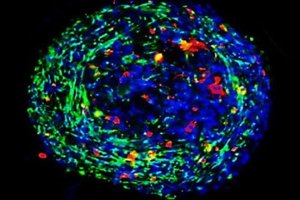- Home
- Editorial
- News
- Practice Guidelines
- Anesthesiology Guidelines
- Cancer Guidelines
- Cardiac Sciences Guidelines
- Critical Care Guidelines
- Dentistry Guidelines
- Dermatology Guidelines
- Diabetes and Endo Guidelines
- Diagnostics Guidelines
- ENT Guidelines
- Featured Practice Guidelines
- Gastroenterology Guidelines
- Geriatrics Guidelines
- Medicine Guidelines
- Nephrology Guidelines
- Neurosciences Guidelines
- Obs and Gynae Guidelines
- Ophthalmology Guidelines
- Orthopaedics Guidelines
- Paediatrics Guidelines
- Psychiatry Guidelines
- Pulmonology Guidelines
- Radiology Guidelines
- Surgery Guidelines
- Urology Guidelines
New Therapy that prevents fibrosis

Fibrosis is characterized by accumulating masses of collagen-packed scar tissue which can be triggered by surgery, injury or disease.It has a common occurrence and can permanently damage compromised organs. In order to find effective treatments for Fibrosis, researchers at Thomas Jefferson University have developed an antibody-based therapy that prevents collagen molecules from aggregating together and forming fibrils.The study has been published as Monoclonal Antibodies in Immunodiagnosis and Immunotherapy.
Their most recent study reveals the antibody's broad efficacy in multiple mouse models and confirms that it targets the formation of new fibrils in diseased organs, without perturbing existing collagen structures in healthy tissue. In other words, their data provides strong preliminary evidence that this antibody can block abnormal scar tissue formation while leaving normal connective tissue untouched.
"Our experimental therapeutic approach is extremely novel," says senior author Andrzej Fertala, PhD, Professor in the Department of Orthopedic Surgery at Thomas Jefferson University. Many other approaches affect the intracellular processes that control collagen production, but these processes also play a role in other cellular functions. "Blocking these processes is like carpet bombing. You'll hit your intended target, but you'll also create a lot of collateral damage."
In contrast, the researcher's antibody targets collagen molecules after they've been produced by the cell; by binding to and blocking telopeptides -- small regions on collagen molecules that link to telopeptide-binding regions on neighboring molecules to create fibrils -- it obstructs the formation of new fibrils without impeding other functions. When the researchers injected the antibody directly into scar tissue clusters called keloids, collagen fibril formation was reduced. Intravenous administration of the antibody also diminished collagen fibrils in models of lung fibrosis.
"In the initial stages of testing an antibody-based therapy, the biggest concern is a possibility of an off-target effect," says Dr. Fertala. "In the current study, we demonstrate that this is not a problem."
The researchers checked for the presence of antibody in other organs such as the kidney, liver, heart and spleen and could not detect any off-target antibody there. This suggests that the antibody only blocked the formation of new scar tissue rather than disturbing existing pockets of collagen or connective tissue.
"By demonstrating the presence of native collagen fibrils, and, at the same time, the absence of our antibody within healthy organs, we have very compelling evidence that our antibody doesn't bind to collagen molecules already embedded within these organs," says Dr. Fertala. The next steps will be to do further testing, and finally to develop the therapy for use in humans.
Dr. Fertala and his team were granted a patent for this antibody sequence in October, and are currently looking for a commercial partner to test their antibody-based therapy in larger preclinical and clinical trials.
The work is part of an enterprise-wide JeffSolves initiative to bring Jefferson researchers from across disciplines around a common area of study, in this case, the link between wound repair, inflammation, fibrosis, and cancer. In partnership with orthopedic clinicians at Jefferson, Dr. Fertala formed the Scientific Consortium for Arthrofibrotic Research, or SCAR, a new organization aimed at initiating collaborations and research programs that will lead to novel treatments for orthopedic patients who suffer from fibrosis.
The study was funded by NIH grant AR048544. The authors report no conflicts of interest.
collagen fibrilscollagen moleculesfibrosisImmunodiagnosis and ImmunotherapyinjuryMonoclonal Antibodiesscar tissuesurgeryThomas Jefferson University
Source : Press ReleaseNext Story
NO DATA FOUND

Disclaimer: This site is primarily intended for healthcare professionals. Any content/information on this website does not replace the advice of medical and/or health professionals and should not be construed as medical/diagnostic advice/endorsement or prescription. Use of this site is subject to our terms of use, privacy policy, advertisement policy. © 2020 Minerva Medical Treatment Pvt Ltd